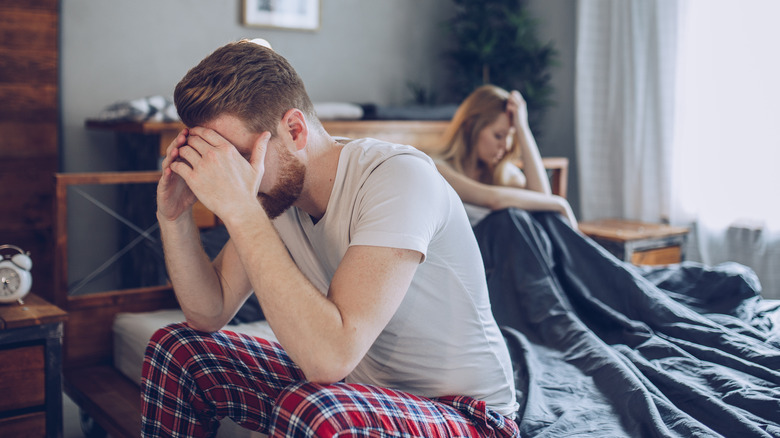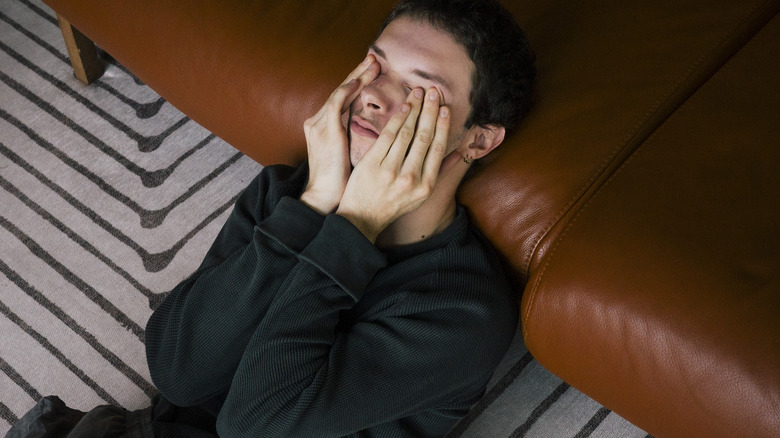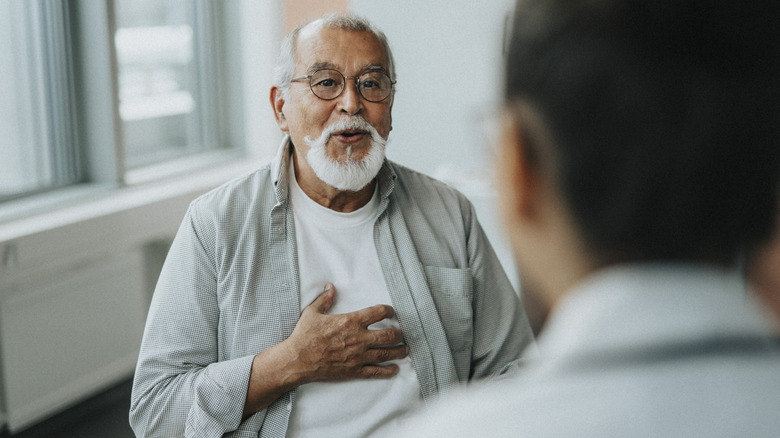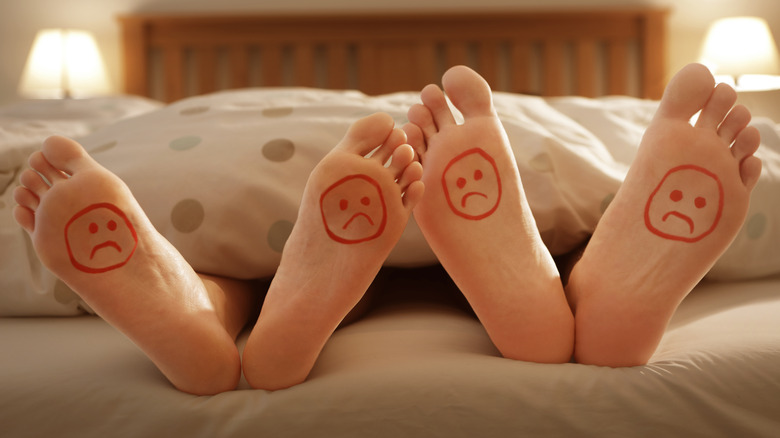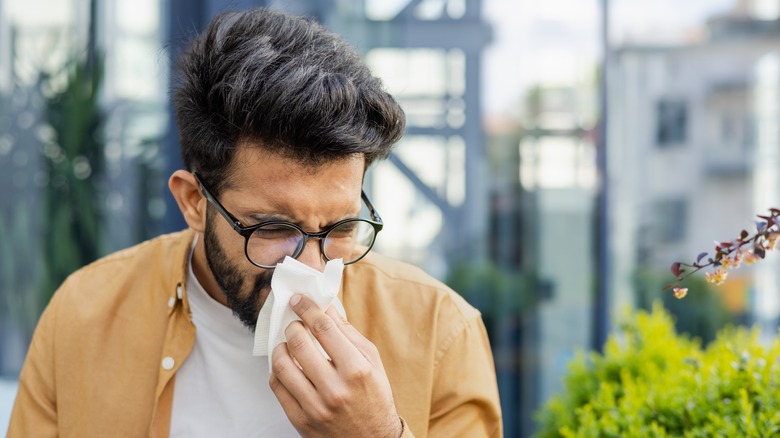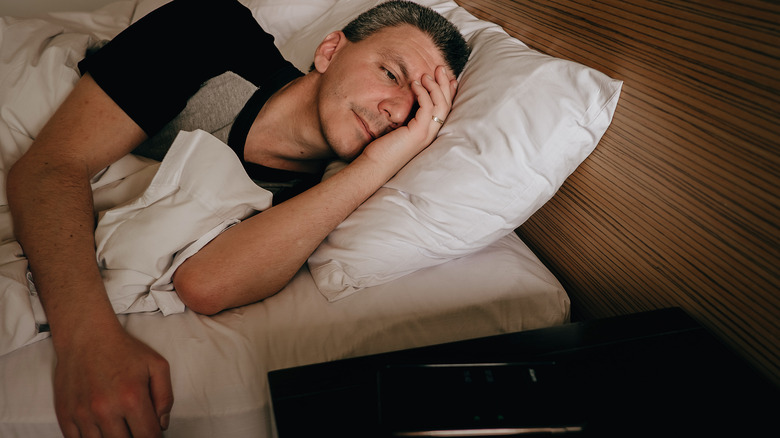When Men Stop Having Sex, This Is What Happens
According to the American Sexual Health Association (ASHA), sex and sexuality are important, normal, healthy, and positive parts of life that not only provide the ability to reproduce but also offer the chance to experience pleasure, satisfaction, and intimacy. Moreover, it has been proven that sex provides a wide array of health benefits, including boosting your heart health, improving mental health and well-being, bettering social relationships, and even helping with pain relief (via Healthline). Nevertheless, sometimes you might find yourself going through a dry spell, either by choice or due to circumstances out of your control.
When it happens to people assigned male at birth (AMAB), a range of unexpected side effects might come up, impacting overall well-being. For example, evidence suggests that a sexual hiatus might impact anxiety levels (in some cases for better but, in others, for worse), heighten stress, affect life expectancy, increase the susceptibility to illnesses, interfere with sleep, and potentially increase the risk of depression, erectile dysfunction, and prostate cancer. In sum, the decision to stop sexual activity can have far-reaching and multifaceted consequences on the physical and emotional health of a person AMAB. Keep reading to discover what happens to people AMAB when they stop having sex.
Your social anxiety might rise
Going through a dry spell may increase your social anxiety, a phenomenon that shows the connection between sexuality and mental well-being. According to a 2014 study published in Archives of Sexual Behavior, undergraduate students reported that having sex one day helped relieve social anxiety symptoms the following day, with a more significant reduction when the act resulted in "more intense experiences of pleasure and connectedness." In this way, sex offers not just physical pleasure but also psychological benefits that contribute to overall wellness.
In other words, the correlation between less sex and more social anxiety comes from the psychological and emotional benefits that come from feeling desired and connected. As stated in a 2016 study published in the Journal of Health and Social Behavior, recognizing sex as a type of social relationship explains why sexuality increases social integration and social and emotional support. Per the study, this might be attributed to the benefits of sex on emotional closeness and availability of a confidant, as well as the benefits of physical touch. Yet, while the study suggests that intimate relationships are more likely to provide emotional support to people AMAB than to those assigned female at birth (AFAB), they can also do so even when people are no longer sexually active.
Your stress levels might spike
As a human being, your body's fight or flight response leads to a cascade of metabolic reactions that end with the release of stress hormones, such as cortisol. However, it has been well-established in medicinal literature that sex triggers the release of various hormones, such as oxytocin and endorphins, which help reduce stress and promote relaxation. For example, a study published in Psychosomatic Medicine found that sex helped bring cortisol levels back to the normal range in stressed people, both AMAB and AFAB.
Also, according to a study published in the Journal of Health and Social Behavior, the effects of sex on mood and stress levels are comparable to those of traditional physical exercise. Plus, oxytocin's release, namely after an orgasm, promotes feelings of pleasure and bonding, acting as a natural stress reliever that persists after the sexual encounter. Another explanation behind sex's stress-relieving effects comes from its indirect ability to provide access to emotional "coping resources" that can help counter the detrimental effects of stress. Without regular sexual activity, people AMAB may miss out on these hormonal benefits, leading to a buildup of stress over time.
You are more likely to develop erectile dysfunction
Erectile dysfunction (ED) or impotence is the inability to achieve or maintain an erection that's firm enough and lasts long enough to ensure a satisfactory sexual performance, a condition that is believed to affect up to 50 million people AMAB in the U.S. and at least 150 million worldwide (via the National Library of Medicine (NLM)). While ED may unsurprisingly put a damper on sex, evidence suggests that not having enough sex might actually increase the risk of ED.
For instance, according to a study published in the Journal of Huazhong University of Science and Technology, people AMAB who reported having sex twice a week had a 63% reduction in ED risk. In comparison, those who reported having sex three or more times per week showed an 85% risk reduction, as opposed to the ones who reported a sexual frequency of less than once per week. However, the findings also state that while morning erections don't have any effect, masturbation might provide the same benefit. Similarly, another study published in The American Journal of Medicine determined that having sex regularly protects against ED in people AMAB between 55 and 75 years of age. In this study, having sex less than once per week doubled the chances of developing ED.
Anxiety levels may drop in people with erectile dysfunction
While it has been established that lack of sex may increase the risk of anxiety and ED, these effects are mostly accounted for by people AMAB who aren't experiencing ED. Yet, the decision to stop having sex can lead to a decrease in anxiety levels for those who do. As Dr. Joe Kort, PhD, MSW, MA, an AASECT certified sex therapist, psychotherapist, and the founding director of the Center for Relationship and Sexual Health in Royal Oak, Michigan, explains via HealthCentral, ED often brings a heavy burden of anxiety and self-doubt, creating a cycle of anxiety where the fear of failure worsens the condition, making it even more challenging to perform sexually. Therefore, people with ED may actually choose to avoid sex altogether due to its emotional toll (via Johns Hopkins Medicine).
That being said, the counterintuitive yet unsurprising anxiety-reducing effect of a sex drought in people with ED derives from the removal of expectations and performance pressure associated with sex, an unspoken consequence of sexuality that is more likely to affect people AMAB due to social norms of masculinity, as explained in a study published in the Journal of Health and Social Behavior.
You have a higher chance of developing sexual performance anxiety once you become sexually active again
While some people AMAB who are not sexually active may spend their days looking forward to the day their dry spell ends, others might develop anxiety about their ability to perform. This specific type of anxiety, known as sexual anxiety or sexual performance anxiety, more often than not revolves around concerns about satisfying a partner or meeting perceived sexual standards (via Medical News Today (MNT)), and it might be especially worrisome for those who have experienced difficulty in the past. For instance, according to a study published in The New England Journal of Medicine, out of 1,455 participants AMAB who were between 57 and 85 years old, 75% reported anxiety about performance as one of their most common sexual problems.
As with ED, this anxiety can become a self-fulfilling prophecy, where performance pressure leads to increased stress and nervousness during sex, which in turn can cause or worsen their performance issues. Luckily, there are a number of techniques that might help you overcome this sex hiccup, including trying guided meditations, mindfulness, or yoga to help you focus on what you're feeling instead of overthinking sex or going to sex therapy or couples counseling (per MNT). In some cases, your healthcare provider might prescribe ED medication, which might lower your anxiety by boosting your confidence (via hims).
Your risk of prostate cancer might increase
Believe it or not, scientists have found an association between sexual activity and prostate health in which evidence suggests that having more sex might lower the risk of developing prostate cancer, according to a study published in The Journal of Sexual Medicine. For example, researchers found that people AMAB who've never had sex had double the risk of developing the cancer compared to those who were sexually active (via LiveScience). Similarly, another study found that people who ejaculated over 20 times per month had a prostate cancer risk reduction of 20% compared to those who did so up to 7 times in the same period (per Harvard T.H. Chan School of Public Health).
The logic behind the association seems to come from a protective effect brought by ejaculation, which is believed to help clear the prostate gland of potentially harmful substances. However, according to LiveScience, the protective effects can be narrowed down to sex's way of reducing inflammation. In any case, this means that when you stop having sex, the reduction in the frequency of ejaculations might lead to the accumulation of inflammatory cells and other potential cancer-causing substances and toxins near the prostate, which might contribute to the development of prostate cancer.
You risk having a shorter life expectancy
When people AMAB stop having sex, they risk having a shorter life expectancy, reflecting the complex relationship between sexual activity and overall health. For instance, a review published in the International Journal of Sexual Health reported that, in an American study, people AMAB who had sex more often had a lower mortality rate 25 years later, while a Swedish study determined that those who stopped having sex had an increased mortality risk just five years later. Similarly, a study published in The Journal of Sexual Medicine stated that people AMAB who had sex less than once a month doubled their risk of death compared to those who had sex at least twice a week.
While the review says that the exact reasons behind the benefits of sex on life expectancy are unclear, regular sexual activity has been linked to a range of health benefits, including improved heart health, better mood and mental health, and a strengthened immune system, all of which can contribute to a longer, healthier life (via Healthline). However, while maintaining an active sex life can be an important component of one's overall health, it is not its sole determinant. Keep in mind that a balanced lifestyle, including a healthy diet, regular exercise, and avoiding harmful behaviors like smoking and excessive alcohol consumption, is also crucial for longevity.
You may have an increased risk of depression
Sex and depression have a long-known connection. Yet, their link has been broadly studied in the context of depression leading to a reduction in sexual activity and, in a lesser way, when it is the other way around. For example, both the symptoms of depression, as well as some of its medical treatments, are known to reduce sexual desire or libido in both people AMAB and AFAB (via Psychology Today). However, research has started to uncover that the absence of sexual activity can also impact mental health, increasing the risk of depression.
On the one hand, according to a study published in The Journal of Sexual Medicine, having less sex and masturbating more often have been linked to both less happiness and depression. This can be explained by their effect on the emotional benefits of sex, ultimately leading to a decline in relationship satisfaction, sex life fulfillment, and mental well-being. On the other hand, a study published in The Journal of Sexual Medicine, which analyzed the benefits of sex during the COVID-19-related lockdown, found that not having sex during that time increased the risk of anxiety and depression. This study attributed the effect to the ability of sex to boost testosterone levels, seeing that low testosterone levels are a risk factor for depression in people AMAB, per a study published in Comprehensive Psychoneuroendocrinology.
If you or someone you know needs help with mental health, please contact the Crisis Text Line by texting HOME to 741741, call the National Alliance on Mental Illness helpline at 1-800-950-NAMI (6264), or visit the National Institute of Mental Health website.
You might get sick more easily
Regular sexual activity is associated with a range of health benefits, including boosting your immune system. According to a study published in Psychological Reports, college students who had frequent sex (defined by the study as having sex once to twice a week) had higher levels of immunoglobulin A (IgA) in their saliva compared to those who had sex less frequently, and even to those who had sex three or more times per week. IgA is an antibody that plays a crucial role in the immune function of mucous membranes, such as the ones covering your lungs and sinuses, by protecting them against infections. In fact, according to a review published in Antibodies, the importance of IgA in these mucous sites comes from their higher likelihood of infection, given their greater exposure to inhaled contaminants and pathogens.
Nevertheless, a review published in the International Journal of Sexual Health showed that masturbation in people AMAB might provide a solution to the inconvenience that going through a dry spell can cause to the immune system. Per the review, while sex can improve immunity, masturbation seems to provide the same protective effect in people AMAB by increasing the number of immune system killer cells and, thus, reducing their susceptibility to illnesses.
You might have trouble sleeping
If you've ever fallen blissfully asleep after sex, then you might understand where this particular side effect of a sex drought is coming from. Evidence shows that sex leads to hormonal changes that can help prepare the body for rest, making it easier to fall asleep and enjoy a deeper, more restorative sleep. But, besides the increase in oxytocin levels and the reduction in cortisol levels that help reduce stress after an orgasm, a review published in the International Journal of Sexual Health includes muscle relaxation as an additional element that helps with post-sex sleep. Per the review, since the sleep-promoting effects of sex seem to be more pronounced after an orgasm, people AMAB seem to benefit the most from it, which the review attributes to the gender gap in orgasm frequency. This means that they may also have more trouble sleeping when they stop having sex compared to people AFAB.
Another potential reason why you might struggle with sleepless nights when you stop having sex is due to the emotional and psychological comfort that sex provides, such as closeness and intimacy, which also promote restful sleep (via the Sleep Foundation). In fact, per the site, their effect on sleepiness seems to have a greater impact on people AMAB than AFAB.
